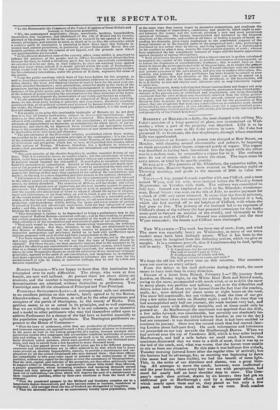BRISTOL COLLEGE. —We are happy to learn that this institution has
triumphed over its early difficulties. The clergy, who were at first hostile, are now well inclined. At present there are about thirty-six students, and the number is increasing every week. Students of all denominations are admitted, without distinction or preference. Two Cambridge men fill the situations of Principal and Vice-Principal.
PAROCHIAL SerrEsstaxx-Laws.—A correspondent calls our attention to an excellent petition on this subject, lately agreed to by the Rector, Churchwardens, and Overseers, as well as by the other proprietors and occupiers of the parish of Sherington, in the county of Bucks. This petition seems to us so sound in its principles, and so well expressed, that we are willing to make room for it in our columns, as an incentive and a model to other petitioners who may feel themselves called upon to address Parliament for a change of the bad laws so hurtful, especially to the population engaged in agriculture. The 'Sherington petitioners re- present to the House of Commons- " That the laws of settlement, while they are productive of chicanery, perjury; and immense expense, are opposed to such a free circulation of labour as is essential to the peace as well as the lasting prosperity of a nation, because amongst other pernicious results they congregate and accumulate indefinite multitudes of persons able and willing to work, where frequently no work is to be obtained, in certain finite districts called parishes, which were marked out nearly one thousand years since, and vary in extent from a few hundred to many thousand acres.
"That by a law passed above two hundred years ago for a far different pnrpose, overseers and churchwardens are in effect ordered to do that which has in many cases proved an absolute impossibility, namely, to provide a maintenance and em- ployment for all the settled inhabitants who may demand them ; that these officers are compellable to levy poor-rates equal in amoilut to the entire income of their parishes, without any regard for the rights or even the subsistence of the proprietors ; that the skill, capital, and industry of the occupiers, are thus often grievously taxed to support either in idleness, or in unproductive labour little better than idleness, a pauper population, whose increasing numbers and menacing demands spread dismay and ruin amongst agriculturists, and threaten to throw various tracts of land out of cultivation,—an event which will deprive the poor of a maintenance in their respective parishes, either by their own exertions or from the hand of the overseer.
"That the pensioned paupers in the Midland and Southern counties are to a lamentable degree demoralized, and have become sullen or insolent, fraudulent or malignant ; and amongst them the ties of kindred are disregarded or forgotten.
"That the aforesaid laws act as an unnecessary bounty upon population, while at the same time they lessen wages by excessive competition, and eradicate the reciprocal feelings of dependeace, confidence, and goodwill, which ought to sub- sist between the master and the servant, creating a new and most pernicious species of villanage. The farmer, impoverished and harrassed by the frequent exactions of the overseer, and certain at all times of finding a supply of hands ex- ceeding his demands, gives wages inadequate to the comfortable support of the honest labourer or to the fancied rights of the pauperized serf ; who, preferring a livelihood by law rather than by labour, and being equally sure of a maintenance let his conduct be what it may, returns the least possible quantity of work ; whence have originated the late compulsory Increase of wages and the hostile aggressions against property of various descriptions. • Your petitioners likewise apprehend that a labour-rate act is neither calculated to augment the capital of the employer, to provide new sources of employment, or to favour the dispersion of supernumerary workmen • that it would have no ten. dency to lessen the above-mentioned evils of the poor-laws, or to render the pauper more worthy of his pay than he now is ; that it would interfere with the interests and private concerns of the agriculturist, and give rise to endless altercation, dis- content, and jealousy. And your petitioners beg leave humbly to submit to your Honourable House, that the situation or' the farmer can never be placed on a fair equality with that of the tradesman, the merchant, or the householder, till he is at liberty to hire and employ such labourers only as may voluntarily engage to serve him.
" Your petitioUers, firmly believing that future insurrections and danger not only to property, but to the lives of his Majesty's subjects, must ensue from a blind perse- verance in the present laws of settlement and employment, and being thoroughly convinced that the evils of them may he entirely removed from the rising genera- tion, and greatly mitigated with respect to the present, entreat your Honourable House to take measures for their gradual repeal; and for the proration of this object, they are of opinion that voluntary colonization on an extensive scale should be resorted to and encouraged ; at once affording scope for a superabundant popu- lation, replenishing fruitful and healthy settlements, and insuring the internal peace and prosperity of the United Kingdom."


























 Previous page
Previous page